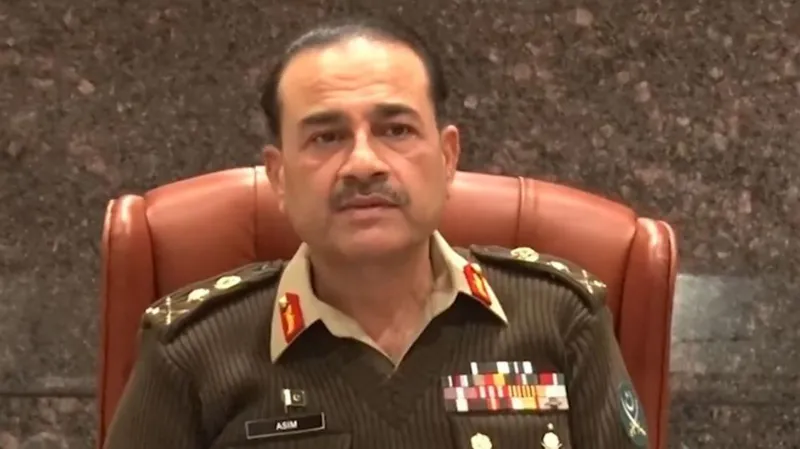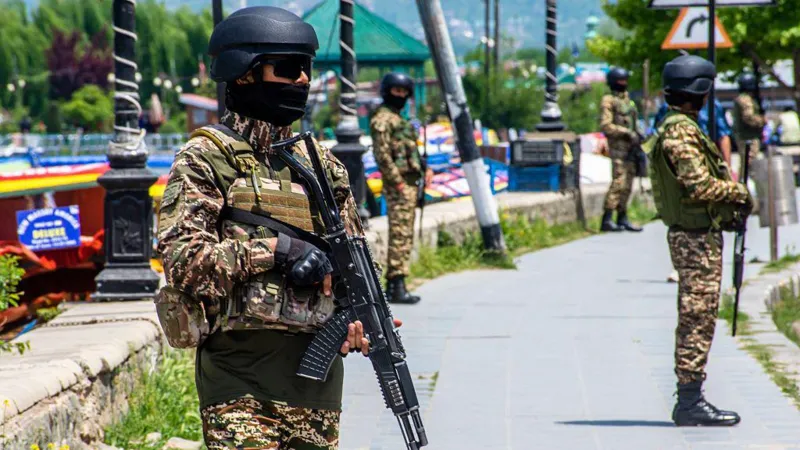Basic Asim Munir, Pakistan’s present military chief, is usually identified for sustaining a low public profile.
Nevertheless, latest occasions have positioned him on the focus—not simply inside Pakistan, but additionally in India and main diplomatic arenas globally. His feedback concerning Kashmir, delivered shortly earlier than a lethal militant assault in Indian-administered Kashmir that left 26 folks lifeless, have sparked renewed scrutiny of Pakistan’s navy insurance policies and their potential influence on regional tensions.
Kashmir has remained a contentious area between India and Pakistan since their separation in 1947, with each international locations claiming it in full however solely controlling elements of it.
Though Gen Munir’s statements haven’t been straight tied to the incident, analysts have intently examined them, suggesting they could point out a extra assertive or confrontational navy posture. His phrases are vital, as he leads Pakistan’s strongest establishment—one typically criticized for its deep affect within the nation’s political affairs, together with the rise and fall of governments.
As India-Pakistan relations turn out to be more and more strained as soon as once more, Gen Munir’s position is seen as pivotal in managing—or probably escalating—a fragile standoff between two nuclear-armed neighbors.
However what is understood about Basic Munir himself, and what motivations form his management?

Basic Asim Munir, presently in his late 50s, comes from a scholarly background—his father served as a college principal and was additionally a non secular scholar. He started his navy profession in 1986 after enrolling by means of the Officers Coaching College in Mangla and obtained the distinguished Sword of Honour for being the highest cadet. Following his coaching, he was commissioned into the 23 Frontier Power Regiment.
Over the course of practically 40 years, Basic Munir has held a number of key roles throughout the navy. He commanded forces close to the delicate northern areas alongside the Line of Management in Kashmir, led Pakistan’s intelligence companies, and represented Pakistan in Saudi Arabia to strengthen bilateral defence cooperation.
He holds a grasp’s diploma in public coverage and strategic safety administration from the Nationwide Defence College in Islamabad. Moreover, he has pursued additional navy training in establishments based mostly in Japan and Malaysia.
In 2023, I noticed Basic Munir at an occasion in Islamabad. The venue was crammed with diplomats, navy officers, ministers, and media personnel. Wearing civilian apparel, he carried himself with quiet confidence and scanned the viewers as he walked to the rostrum.
He started his speech by reciting verses from the Quran, underscoring his distinction as a hafiz—somebody who has memorised the Quran utterly—which is uncommon amongst Pakistan’s navy management.
In private interactions, Basic Munir appeared courteous and soft-spoken. Nevertheless, on stage, he exhibited the main target and authority anticipated of a former intelligence chief—calculated and attentive. His affect now extends far past Pakistan’s borders.
Appointed as Pakistan’s Chief of Military Employees in November 2022, Basic Munir assumed management throughout a time of deep political instability, a worsening financial disaster, and rising public criticism of navy involvement in politics.
His choice adopted a interval of uncertainty, partly on account of tensions with former Prime Minister Imran Khan. Basic Munir’s tenure as the top of the Inter-Providers Intelligence (ISI) lasted solely eight months earlier than he was eliminated, a transfer extensively believed to be politically motivated—although each events deny any private dispute. That incident marked a key shift of their relationship.
Right this moment, Imran Khan is imprisoned, and Basic Munir holds appreciable authority within the nation.
Many analysts see Basic Munir’s management fashion as distinct from his predecessor, Basic Qamar Javed Bajwa. Basic Bajwa was extra inclined in the direction of public engagement and supported discreet diplomatic initiatives with India. In 2019, throughout a interval of heightened navy stress, Bajwa took a restrained strategy, overseeing a restricted navy response after the Pulwama assault and finally returning a captured Indian pilot, a transfer credited with de-escalating potential battle.
Bajwa’s management turned related to the “Bajwa Doctrine,” which emphasised regional peace, financial technique, and stability along with standard safety objectives.
Abdul Basit, a senior fellow at Singapore’s S. Rajaratnam College of Worldwide Research, remarked that Bajwa was pragmatic and dealt with a number of worldwide fronts—similar to India, Afghanistan, and the U.S. withdrawal—by means of diplomatic channels.
In distinction, Basic Munir is going through pressing challenges. In keeping with Basit, Munir doesn’t have the luxurious of extended planning. With rising safety threats, political unrest, financial instability, and complicated regional dynamics, Munir is predicted to reply swiftly and decisively, each domestically and internationally.

Kashmir stays a extremely delicate and strategic matter for Pakistan’s navy management, making it politically unattainable for any military chief to look lenient, based on analysts.
Amir Zia, a political and protection commentator, informed the BBC that “Kashmir is embedded in Pakistan’s nationwide safety narrative. It’s ingrained within the training system, and extensively understood that India should not be allowed any higher hand on the problem.”
A latest assault in Indian-administered Kashmir, probably the most lethal Pahalgam Attack concentrating on civilians in 20 years, has intensified tensions. India has accused Pakistan of backing the perpetrators—allegations Pakistan firmly denies. The opportunity of Indian navy retaliation has raised regional issues.
Since assuming command, Basic Asim Munir has stored a low public profile. Nevertheless, one specific speech he gave on April 17 in Islamabad drew vital consideration. Addressing members of the abroad Pakistani group, he emphasised cultural and ideological variations between Pakistanis and Hindus. He additionally strengthened Pakistan’s conventional stance on Kashmir, describing the territory because the nation’s “jugular vein” and expressing unwavering help for Kashmiris resisting Indian rule.
What made the speech particularly noteworthy was its proximity to a militant assault in Pahalgam on April 22, during which vacationers in Indian-administered Kashmir have been focused.
In keeping with Joshua T. White, a South Asia scholar at Johns Hopkins College, whereas the speech’s content material echoed longstanding Pakistani narratives, its overt non secular framing made it notably provocative. “The timing, simply forward of the Pahalgam incident, has made it a lot tougher for Pakistan to argue for de-escalation or interact in quiet diplomacy,” he stated.
Former Pakistani Excessive Commissioner Abdul Basit additionally acknowledged that the speech could have been miscalculated. “It’s attainable Gen Munir was swept up by the event. Whereas such remarks could have been much less controversial in personal, coming from the military chief in a public setting, they appeared extremely confrontational,” he stated.
Some observers interpreted the speech as a present of power, suggesting it marked Gen Munir’s assertive entry because the navy’s dominant determine and a sign that the military stays central to nationwide policy-making.
Earlier in February, throughout a speech on Kashmir Solidarity Day in Muzaffarabad, Gen Munir had already struck a agency tone. He declared that Pakistan had engaged in three wars over Kashmir and was ready to battle ten extra if wanted.
Nevertheless, given the proximity of his newest speech to the Pahalgam violence, it’s this assertion that has sparked renewed scrutiny and heightened suspicions. Though India has not supplied direct proof linking Pakistan to the assault, the rhetoric has solely intensified mutual mistrust.

At house, many view Basic Munir as a strategic and resolute chief, firmly working to reestablish the navy’s dominance in nationwide affairs.
Following the violent unrest on 9 Could 2023 after Imran Khan’s arrest, Basic Munir initiated a big crackdown concentrating on Khan’s followers.
This included attempting civilians below navy laws, retiring a senior common early, and arresting former ISI chief Lt Gen (retired) Faiz Hameed, who was beforehand thought-about near Khan.
Whereas critics labeled these strikes as a purge of Khan’s allies, others interpreted them as efforts to revive self-discipline inside Pakistan’s navy ranks, notably after challenges to the authority of each Gen Bajwa and Gen Munir, who had turn out to be topics of public disapproval.
Now over two years into his five-year tenure, Basic Munir is already shaping what might turn out to be a defining legacy.
The evolving tensions with India—whether or not they intensify into navy battle or are resolved diplomatically—will probably be influenced by the course Munir chooses to take.
Analyst Mr. Basit notes that the approaching weeks are essential in figuring out the result.
“Gen Munir’s strategy to this disaster shall be telling—not solely of his management fashion but additionally of the position Pakistan goals to play within the area. At this level, that path lies largely in his palms.”
Observe share4all.cc for extra updates.




















 Animals
Animals